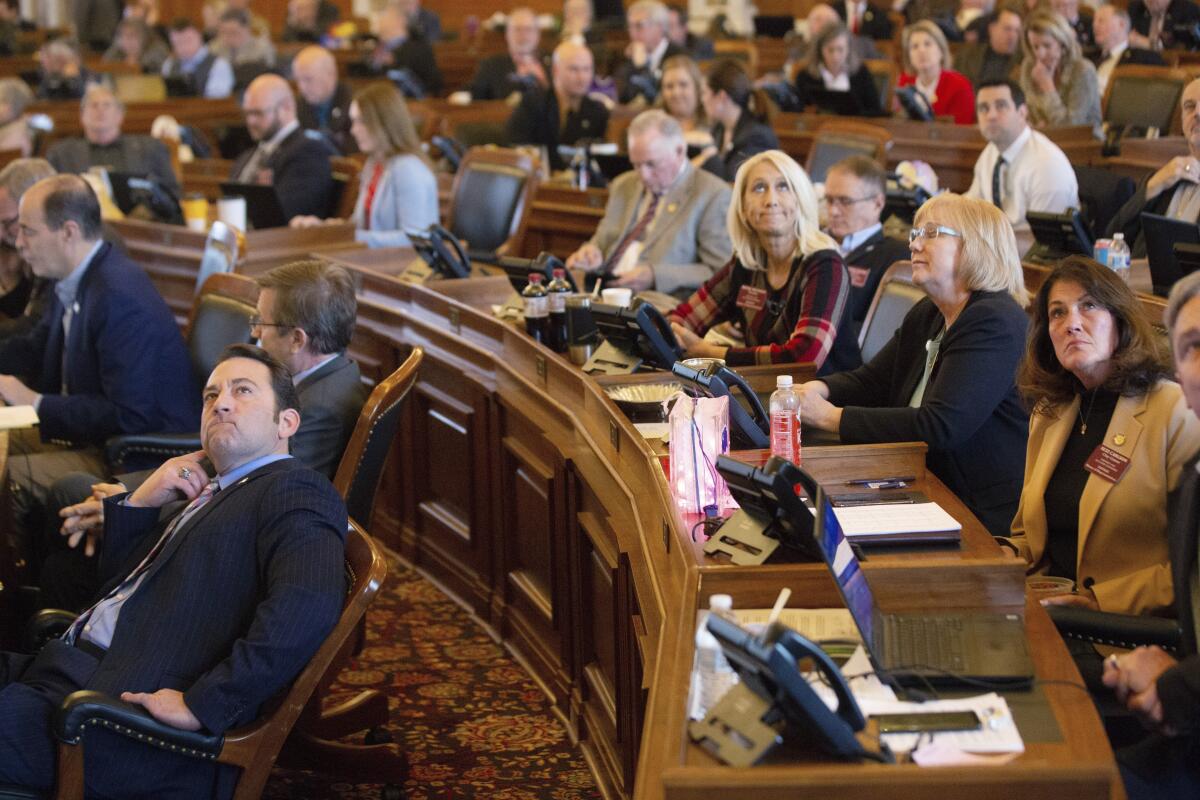Kansas GOP lawmakers fail in antiabortion amendment effort

TOPEKA, Kan. — Republican lawmakers in Kansas on Friday failed to get a proposed antiabortion amendment to the state constitution on the ballot, stalling efforts to ensure that its Bill of Rights does not secure a right to an abortion.
Neither side expected Friday’s vote in the Kansas House to be the last word on whether the measure ultimately is put to a vote in a statewide election, when a simple majority would change the state constitution. Abortion opponents are almost certain to try again, with lawmakers expected to be in session until early May.
The House vote was 80-43 on the measure, which is aimed at overturning a Kansas Supreme Court decision last year protecting abortion rights, after the Senate approved it last week. Supporters were four votes short of the two-thirds majority needed in the 125-member House, even after supporters kept the roll open for five hours to build pressure for yes votes.
Both sides lobbied hard and waged Twitter campaigns after the House gave the measure first-round approval Thursday, but with only 80 of the 84 votes needed for final passage. Abortion rights advocates had portrayed it as a step toward a ban on abortion.
“The way it is written is extremist,” Rep. Nancy Lusk, a Kansas City-area Democrat, said before Friday’s vote. “It is cleverly written to kind of disguise, I think, what the real purpose is.”
The Kansas Supreme Court ruling came in a state where the Republican-controlled Legislature has had solid anti-abortion majorities for two decades and immediately sparked intense criticism of the court. Democratic Gov. Laura Kelly, elected in 2018, supports abortion rights, but lawmakers enacted a raft of new restrictions under Kelly’s two GOP predecessors.
Supporters argued that they were preserving the Legislature’s power to regulate abortion.
“It will keep our regulations in place that we have for the safety and health of mothers and the unborn,” said Rep. Susan Humphries, a Wichita Republican.
Abortion opponents worry that if the ruling is not overturned, the state’s courts will invalidate most or all of the restrictions enacted over more than 20 years, including a 24-hour waiting period for women seeking abortions, a parental notification law for most minors seeking to end their pregnancies, restrictions on late-term abortions and requirements designed to ensure that patients’ consent to procedures is informed.
And that prospect has arisen even as both sides speculate about whether the U.S. Supreme Court will overturn its historic 1973 Roe vs. Wade decision legalizing abortion across the nation. Without a change in the Kansas Constitution, state courts still could strike down laws that would survive federal court challenges.
Kansans for Life, the state’s most influential antiabortion group, announced as House members were voting that it would oppose expansion of the state’s Medicaid health coverage for the poor until the amendment goes on the ballot. Expansion is a top priority for Democrats and many moderate Republicans.
Supporters of the amendment argued that Kansas faced the prospects of unregulated abortion. They even suggested that the result would be a return to dangerous “back alley” clinics.
“I venture to say that all of us have women that we love and care about very deeply,” said Rep. Renee Erickson, another Wichita Republican. “Wouldn’t you want the best care for her, emotionally and physically? Of course. We all would.”
Last year’s Kansas Supreme Court ruling declared that the state’s Bill of Rights grants a “natural right of personal autonomy” that includes the right to “control one’s own body,” making access to abortion a “fundamental” right. Kelly last week declared those rights “foundational to who we are as a state and as a nation” and predicted that adopting the amendment would return Kansas “to the Dark Ages.”
“We have to understand it in a context, which is they want a green light to be able to limit, if not eliminate, access to a currently safe and legal medical procedure,” said Andrea Miller, president of the New York-based National Institute for Reproductive Health. “It is one more example of a panoply of states that have really been in kind of a rush to the bottom.”
The timing of the statewide vote was an issue for some lawmakers. Supporters argued that they chose the August primary so that the question did not get lost amid the presidential election.
But the smaller primary electorate traditionally skews more conservative than the larger general election electorate, and some abortion-rights advocates thought the measure would fail in November. Several lawmakers voting no said they wanted the measure to be on the November ballot.
The proposed amendment would declare that the state constitution does not secure a right to abortion or the public funding of abortions. It would allow legislators to regulate abortions even in cases of rape and incest or when a woman’s life is in danger, “to the extent permitted” by federal court decisions.
More to Read
Sign up for Essential California
The most important California stories and recommendations in your inbox every morning.
You may occasionally receive promotional content from the Los Angeles Times.










